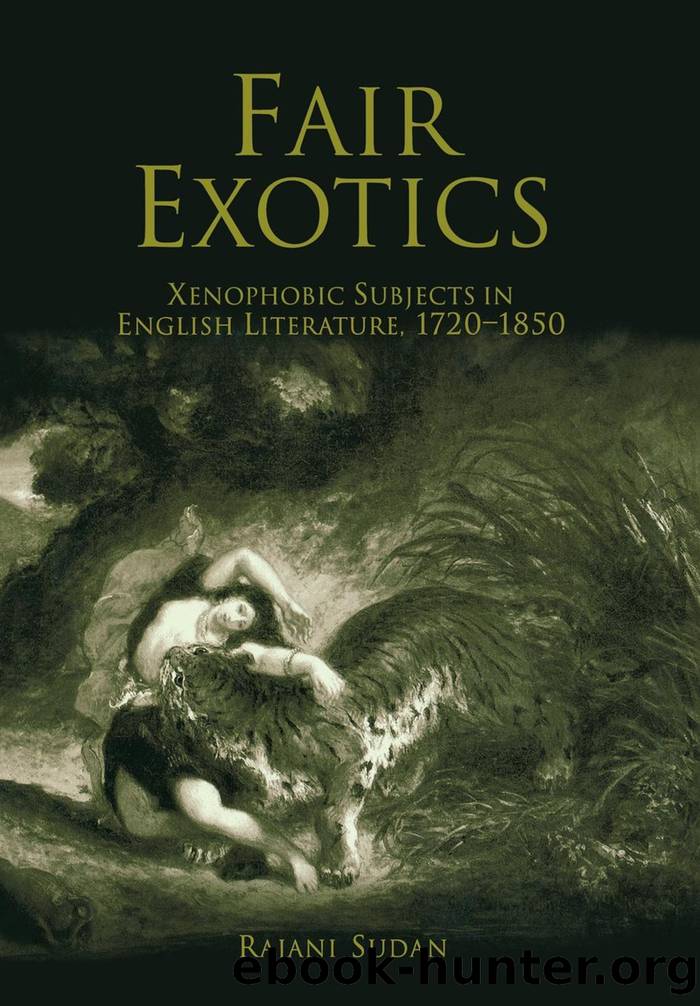Fair Exotics by Sudan Rajani;

Author:Sudan, Rajani;
Language: eng
Format: epub
Publisher: University of Pennsylvania Press
Published: 2002-08-15T00:00:00+00:00
4 Fair Exotics: Two Case Histories
in Frankenstein and Villette
Food loathing is perhaps the most elementary and most archaic form of abjection. When the eyes see or the lips touch that skin on the surface of milkâharmless, thin as a sheet of cigarette paper, pitiful as a nail-paringâI experience a gagging sensation and, still farther down, spasms in the stomach, the belly ⦠nausea makes me balk at that milk cream, separates me from the mother and father who proffer it. âIâ want none of that element, sign of their desire; âIâ do not want to listen, âIâ do not assimilate it, âIâ expel it. But since the food is not an âotherâ for âme,â whom am only in their desire, I expel myself, I spit myself out, I abject myself within the same motion through which âIâ claim to establish myself.
âJulia Kristeva, Powers of Horror
In this chapter I continue to examine the problems gender poses to ideological configurations of romantic identity by examining two novels. Shelleyâs Frankenstein and Brontëâs Villette are narratives that mark the perimeters of feminine domesticity as national affiliation. Both novels demonstrate to varying degrees the ways in which the trajectory of romanticism is domestic. As in the case of De Quincey, Shelley and Brontë coopt foreign ideas of exoticism in order to enrich the native larder; however, unlike De Quincey, they also situate representations of romanticism outside the cultural confines of imperial England.
The extent to which nationalism functions as a domesticating shield, protecting the mutability of feminine identification from irrevocably falling into the foreign, is arbitrated on foreign soilâat least soil that the cultural imaginary has fashioned as alien. But questions of how that shield gets established as a shield as well of the relationship between nationalism and domesticity continue to vex romantics through early Victorian representations of the foreign vis-Ã -vis an anglicized household. Unlike Crusoeâs negotiations with alternative island commerce, both Frankenstein and Villette imagine domesticity as the final site for national propagation. Early Victorian mediations of national identification station Englishness as an unmistakably coherent entity to be pitted against its colonial brethren; romantic desires to incorporate the exotic, however, complicate imperial injunctions for national purity.
Monstrosityâs Issue
âLike the flowers that are planted in too rich a soil,â writes Mary Wollstonecraft, âstrength and usefulness are sacrificed to beauty; and the flaunting leaves, after having pleased a fastidious eye, fade, disregarded on the stalk, long before the season when they ought to have arrived at maturity.â1 So Wollstonecraft begins her vindication, clearing the ground for a more fruitful discussion of the ârights of woman.â Mobilizing aspects of womenâs work as an arena of womenâs power, she sought to undo myths about sensibility that enervated and debilitated women rather than sharpened their capacities for feeling. Twenty-four years later Mary Shelley appropriates Wollstonecraftâs metaphors to describe a very different scenarioâthe idealized relation between Caroline Beaufort and her husband, Alphonse Frankenstein: âEvery thing was made to yield to her wishes and her convenience. He strove to shelter her, as a
Download
This site does not store any files on its server. We only index and link to content provided by other sites. Please contact the content providers to delete copyright contents if any and email us, we'll remove relevant links or contents immediately.
4 3 2 1: A Novel by Paul Auster(11788)
The handmaid's tale by Margaret Atwood(7447)
Giovanni's Room by James Baldwin(6808)
Asking the Right Questions: A Guide to Critical Thinking by M. Neil Browne & Stuart M. Keeley(5355)
Big Magic: Creative Living Beyond Fear by Elizabeth Gilbert(5351)
Ego Is the Enemy by Ryan Holiday(4956)
On Writing A Memoir of the Craft by Stephen King(4662)
The Body: A Guide for Occupants by Bill Bryson(4581)
Ken Follett - World without end by Ken Follett(4443)
Bluets by Maggie Nelson(4261)
Adulting by Kelly Williams Brown(4232)
Eat That Frog! by Brian Tracy(4149)
Guilty Pleasures by Laurell K Hamilton(4116)
White Noise - A Novel by Don DeLillo(3829)
The Poetry of Pablo Neruda by Pablo Neruda(3814)
Fingerprints of the Gods by Graham Hancock(3737)
Alive: The Story of the Andes Survivors by Piers Paul Read(3730)
The Book of Joy by Dalai Lama(3697)
The Bookshop by Penelope Fitzgerald(3619)
